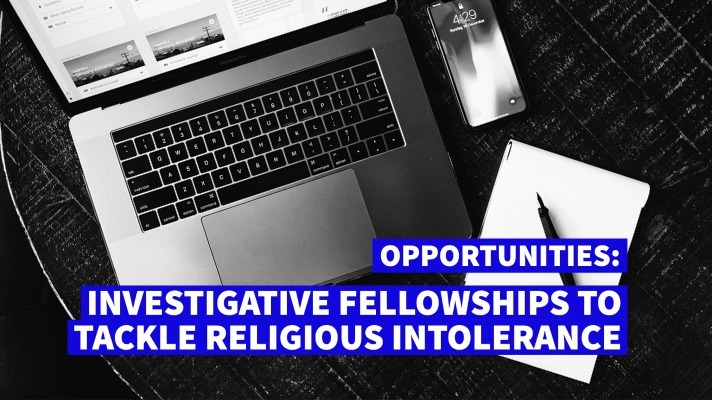Do you want better insight into how religious freedoms and extremism work in your community, and what factors drive militancy?
Apply now for an intensive, free six-week online course that will teach data-driven forensic research techniques for analysing online extremism and militancy, along with investigative journalism skills for producing compelling multimedia storytelling about religious freedom and tolerance.
The course, presented by leading international experts, will be followed by 10 weeks of one-on-one mentorship to help participants produce award-winning solutions journalism that will be published internationally. Participants will receive additional technical support from a team of data scientists, forensic researchers, infographic/interactive designers and news technologists.
The best story pitches during the course will receive cash grants to cover reporting costs.
The fellowships are part of the In The Name of Religion initiative spearheaded locally by Code for Africa (CfA) in Nigeria and the Ayin Network in Sudan, in partnership with the International Center for Journalists (ICFJ). The initiative seeks to support inclusive and fact-driven reportage, that promotes a culture of respect for religious diversity by improving the quality, quantity, and reach of objective reporting on religious freedom.
The Fellowship:
If you are selected for the fellowship you’ll receive the following:
- Six weeks of hands-on training by international experts and local technical teams, via small-class webinars that use a ‘learn-by-doing’ approach.
- A suite of digital multimedia tools and locally-relevant data solutions that will help you produce insightful investigative data journalism, supported by interactive infographics and/or visual social media.
- A suite of digital security tools and a helpdesk hotline, that will help protect you against surveillance and censorship, denial of service attacks and other digital vulnerabilities.
- A chance to win story grants to use your new skills and tools for in-depth analysis and original research/reporting on issues relating to religious freedoms in your community.
- Intensive one-on-one mentorship by a specialist veteran editor/journalist, along with technical support from a team of data scientists, forensic researchers, news technologists and social video/infographic designers.
- Support for syndicating your work into the media, in Africa as well as elsewhere in the world, to help amplify the reach and impact of your journalism.
- The opportunity to network and build collaboration with other African journalists interested in data-driven investigative journalism techniques, and in religious freedom issues.
Are You Eligible?
Applicants must meet the following criteria:
- You must be an established journalist or digital storyteller (such as a blogger or social media content creator) with a minimum one year track-record in journalism and reportage.
- You must publish/broadcast your work in mainstream media. Alternatively, if you curate your own audience on social media or are a blogger, you must be able to demonstrate prior coverage of religious freedom issues.
- You must be based in either Nigeria or Sudan, with demonstrable local experience/insights.
- You must be fluent in English in Nigeria or Arabic in Sudan, which will be the languages of tuition and mentorship. Your storytelling can be produced in another language, but translated copies must be made available in either English or Arabic.
- You must have access to a home laptop/computer with Internet connectivity, to be able to participate in online classes and benefit from the digital mentorship and electronic resources.
- You must be able and willing to commit to attending all classes and completing all lesson assignments during the six-week online course.
- You must have a letter of support from your newsroom manager/editor (if you’re a staff reporter) or a letter of commitment from a partner newsroom (if you’re a freelancer).
- You must commit to sharing your new skills and insights with your newsroom and wider journalistic fraternity, by demonstrating your projects and techniques to peers.
- You do not work for government institutions, state-funded media or paramilitary organisations.
Prioritised Candidates:
Preference will be given to applicants if:
- You have a demonstrable interest in, or prior experience of, reporting on religious freedom issues.
- You are based in regions within Nigeria and Sudan where religious freedom issues and/or intolerance is particularly acute.
- You have a track-record for sharing your skills and insights with wider journalistic networks, and/or are actively involved in internal newsroom training programmes where you can share your new skills/techniques.
The deadline for applications is 25th August 2021
To apply, complete this form.
Questions? Reach out to our Academy team on hello@academy.africa or hello@codeforafrica.org.
About the Partners:
Code for Africa (CfA): is the continent’s largest network of digital democracy laboratories, with over 75 full-time data scientists, forensic researchers, news technologists and digital storytellers working in support of watchdog media partners in 18 African countries. CfA builds digital solutions that provide actionable information to citizens to encourage informed decisions, while also amplifying voices to strengthen civic engagement for improved public governance and evidence-driven accountability.
Ayin Network: is a network of Sudanese journalists working behind the screens to convey developments in the areas of conflicts. Ayin’s mission is to increase the participation of the Sudanese public in the future of the country through access to reliable, high quality news and information in the form of films, in-depth journalism, and social media content
International Center for Journalists (ICFJ): is an international nonprofit that helps build the expertise and storytelling skills of reporters worldwide. ICFJ’s mission is to empower journalists to deliver trustworthy news essential for vibrant societies.
